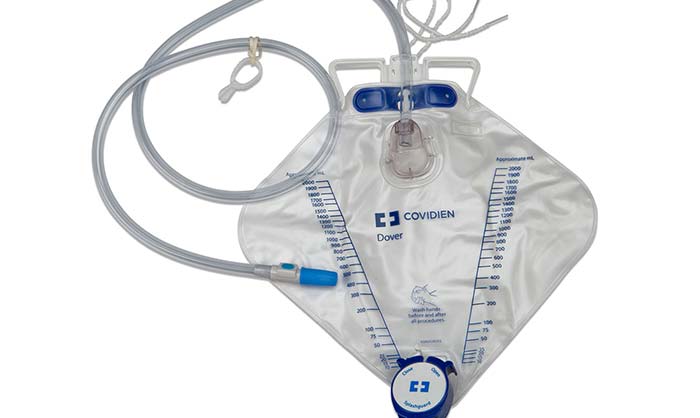When and why does a patient need a long-term indwelling catheter?
Catheters are highly specialized medical instruments widely used in hospital care. These thin, tube-shaped devices are used primarily to drain fluids (blood, urine or any other bodily fluid) in a wide variety of medical cases. Generally, catheters are specifically designed for certain medical needs and are available in various shapes and designs. Catheters can also vary a lot when it comes to the materials used, their lifespan and how often they should be changed, but they can also act as generic one-time use devices employed in highly specific situations (for instance, during emergency surgery procedures).
Catheters – reasons for needing a long-term indwelling catheter
Depending on the patient, his or her medical situation and the prognosis of the disease, catheters can be used temporarily, as a short-term solution, or they can be employed as a long-term solution for a more complicated case. Long-term catheters, used for patients who require constant medical care and long-term assisted fluid drainage, are called indwelling, because they are installed deep into the bladder.
Indwelling catheters are needed by patients whose bladders cannot be emptied fully (a condition called urinary retention) or may empty at inappropriate, irregular times (urinary incontinence). Usually, in most urinary retention or incontinence cases, a different catheterisation procedure is preferred, called intermittent self catheterisation (ISC). Unfortunately, ISC is not a feasible medical procedure for elderly patients or people with poor use of their hands, or people who suffered extensive brain damage, trauma or are in a comatose state. Essentially, ISC, as a procedure, is too risky in these cases, so long-term indwelling catheters are the best choice. Although indwelling catheters are not necessarily used long-term, they are ideal for patients who require long-term catheterisation.
Long-term use of indwelling catheters should be used for patients suffering from:
- any medical condition which affects the proper functioning of the bladder or the urethra; these include conditions which affect or damage the nerves controlling the bladder muscles, such as multiple sclerosis, strokes, spinal injuries, spina bifida and many other neurological diseases;
- any chronic medical condition which reduces a patient’s mobility or awareness; these include terminal illnesses, comas, extensive brain damage, various types of cancers and debilitating diseases associated with old age; typically, these patients do not have the mobility and awareness to be able to use a toilet or a commode;
Let’s have an in-depth look at some of these medical situations where the use of an indwelling catheter is necessary:
Spinal cord injury
Spinal cord injuries are common medical conditions following trauma or accidents. Patients suffering from SCI have very limited mobility and many of their organs may work defectively. After a spinal cord injury, the nervous communication between the brain and the bladder is cut off or severely impaired, making the bladder “flaccid” or “floppy”. Essentially, in the absence of electric stimuli, the bladder muscles fail to contract or relax when needed. In special cases, the impaired communication causes a spastic muscle activity in the bladder, making it hyperactive (the contractions are too often). Hyperactive bladders cause urinary incontinence because the muscles get damaged and the bladder walls become weaker. In these cases, urinary infections are very common. Generally, many people suffering from SCI are paralyzed and have limited use of their hands.
Multiple Sclerosis
Multiple Sclerosis affects more than 400,000 patients in the United States and urinary problems are very common for this medical condition. In fact, poor bladder control or incontinence are some of the first symptoms of multiple sclerosis. Many patients only visit their family doctors after they noticed problems with their bladder. When these problems get worse, doctors will suggest inserting an indwelling catheter to avoid infections and other issues.
Prostate problems
The prostate has an important role for urination, and when it’s not working properly it can cause urinary infections and a decrease in the quality of life. An enlarged prostate, for instance, can cause frequent urination, often during the night, which require medical attention. Generally, this condition is common in older patients and surgery is not a feasible solution. Doctors often recommend installing a long-term indwelling catheter to help these patients live a comfortable life.
Other situations
Patients with spinal muscular atrophy (SMA), a disease that causes muscle weakness, suffer from poor mobility and will require an indwelling catheter to facilitate urination.
Similarly, indwelling catheters are required when patients suffer from urinary retention. In this case, patients are not able to fully empty their bladder when they need to. In severe cases (usually after childbirth), patients might not be able to empty their bladder at all. If this problem persists, extensive medical examinations must be undertaken, as it can be a case of Fowler’s Syndrome.
Indwelling catheters are also used for patients suffering from endometriosis, a condition where endometrial tissue grows uncontrollably in the bladder area, around the uterus and the urethra. If severe cases, emptying the bladder becomes problematic, so an indwelling catheter is the only feasible solution.




